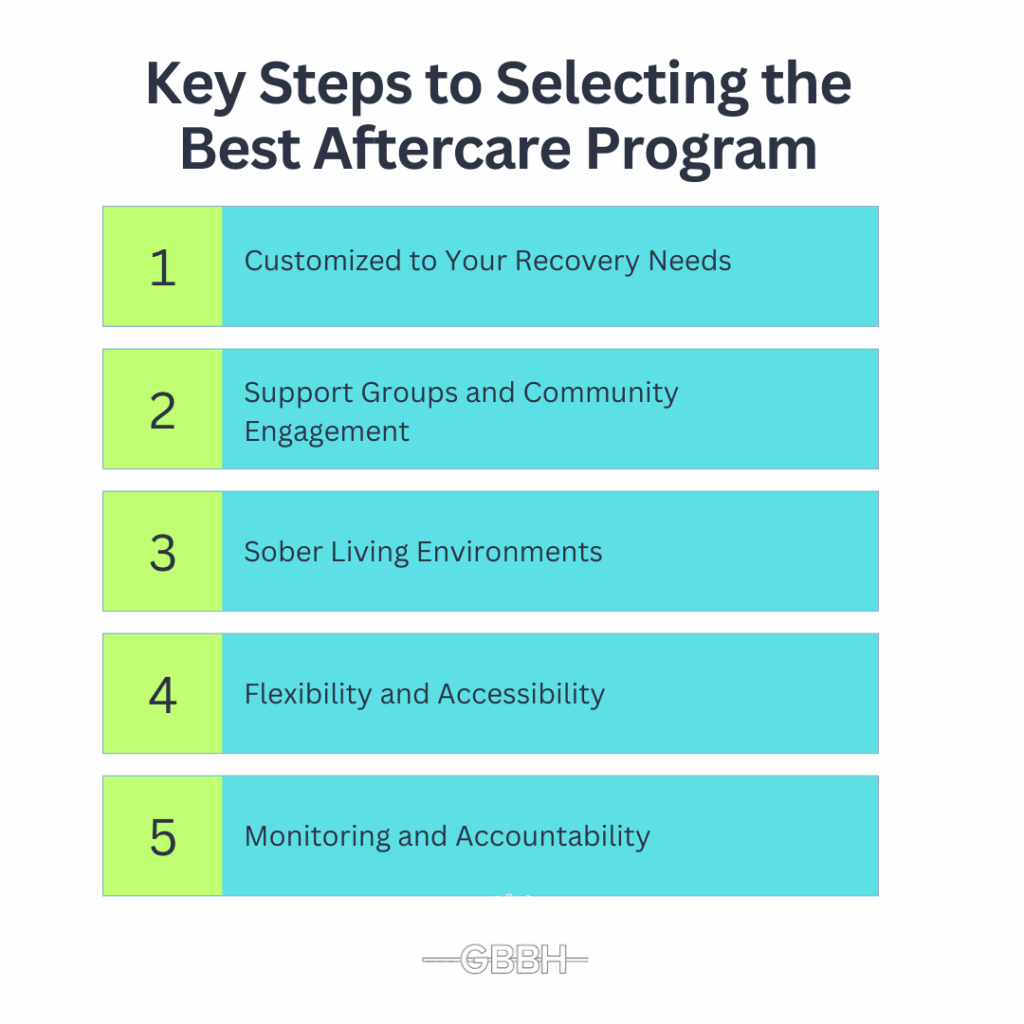Recovering from addiction or mental health issues is a challenging journey that doesn’t end when you complete a treatment program. Aftercare programs play a crucial role in helping individuals maintain the progress they’ve made and continue their path to lasting recovery. These programs provide ongoing support, tools, and resources to prevent relapse and promote mental well-being. In this blog post, we’ll explore how aftercare programs can support your journey to lasting recovery, especially focusing on Mental Health Programs, Addiction Aftercare Programs, and other essential elements of mental health treatment.
Understanding Aftercare Programs
Aftercare programs are structured support systems that follow the initial phase of treatment for mental health or addiction issues. These programs are designed to provide continued care, ensuring that individuals do not feel isolated or unsupported once they leave a Mental Health Treatment Center in Massachusetts or any other treatment facility. The transition from a controlled environment to everyday life can be overwhelming, and aftercare programs are there to bridge this gap.
The Role of Aftercare in Long-Term Recovery
The journey to recovery is not a straight line. It’s a process filled with ups and downs, and aftercare programs are there to help individuals navigate these challenges. Here’s how they support long-term recovery:
Continued Support: Aftercare programs provide a support network that helps individuals stay connected with others who understand their struggles.
Relapse Prevention: One of the main goals of aftercare programs is to equip individuals with the tools and strategies needed to prevent relapse. Through regular therapy sessions, support groups, and check-ins with counselors, individuals can identify triggers and learn how to cope with them effectively.
Skill Development: Aftercare programs often focus on developing life skills that are essential for long-term recovery. This includes stress management, communication skills, and healthy coping mechanisms. By building these skills, individuals are better prepared to face challenges without reverting to old, unhealthy behaviors.
Mental Health Monitoring: Aftercare programs also involve monitoring mental health to ensure that any signs of relapse or new mental health issues are addressed promptly.
Aftercare programs play a critical role in maintaining the progress made during treatment and ensuring long-term success. Let’s explore how aftercare programs support your journey to lasting recovery.
1. Ongoing Support for Long-Term Recovery
Aftercare programs provide essential ongoing support once individuals transition out of formal treatment. Recovery is not a one-time event but an ongoing process that requires continued effort. Aftercare plans include regular therapy sessions, support groups, and resources that reinforce the skills learned during primary treatment. This sustained guidance helps individuals navigate everyday challenges and triggers that may lead to relapse.
By maintaining regular contact with therapists or counselors, individuals receive personalized support to address new or persistent issues. This ongoing engagement helps reinforce coping mechanisms and stress management techniques, ensuring that recovery remains on track.
2. Relapse Prevention Strategies
A key element of aftercare programs is relapse prevention. Aftercare services provide tools and strategies to recognize early signs of relapse and how to handle cravings. Through individual therapy, group sessions, and continued education, individuals are empowered to manage high-risk situations and develop new, healthier responses to stress.
Some aftercare programs incorporate Cognitive-Behavioral Therapy (CBT) or Dialectical Behavior Therapy (DBT) to help individuals maintain emotional stability. These therapies reinforce the skills learned during primary treatment, focusing on managing negative thought patterns, emotional regulation, and decision-making.
3. Access to Support Groups and Community
Aftercare programs often include access to support groups, which provide peer support from others who understand the challenges of recovery. These groups, such as 12-step programs or non-12-step alternatives like SMART Recovery, offer a safe space for individuals to share their experiences, receive encouragement, and build accountability.
The power of community cannot be overstated in recovery. Being part of a group of like-minded individuals facing similar challenges helps reduce feelings of isolation, which can be a significant trigger for relapse. Support groups create lasting connections that continue beyond the initial recovery phase.
4. Structured Sober Living Environments
For some individuals, transitioning directly back to their everyday lives after completing treatment may be overwhelming. Sober living homes offer a structured environment where individuals can continue their recovery journey in a supportive and substance-free setting. These environments promote accountability, self-discipline, and peer support while allowing individuals to practice the skills they have learned in real-life settings.
Living among others who are also in recovery can foster a sense of responsibility and commitment, helping individuals stay on track with their sobriety goals. Sober living homes often come with added resources such as house meetings, drug testing, and support groups, further enhancing the aftercare experience.
5. Family Involvement in Aftercare
Family therapy and involvement are important components of many aftercare programs. Family members often play a critical role in recovery by providing emotional support and understanding. Through family therapy, loved ones can learn about the recovery process, understand their role in supporting their family member, and address any issues that may contribute to addiction or mental health challenges.
Aftercare programs help repair relationships, improve communication, and foster healthier dynamics within the family. A supportive family environment can significantly increase the chances of long-term recovery success.
6. Continued Focus on Mental Health
For individuals dealing with co-occurring mental health disorders, aftercare programs provide continued access to mental health treatment. Regular therapy sessions, medication management, and mental health check-ins are often included in aftercare plans to ensure that any underlying issues, such as anxiety, depression, or trauma, remain under control.
Aftercare programs integrate comprehensive mental health care into the recovery plan to prevent relapse caused by untreated mental health conditions. A focus on mental health alongside addiction recovery strengthens overall well-being and enhances the chances of maintaining long-term sobriety.
7. Building Life Skills and Independence
Aftercare programs don’t just focus on relapse prevention—they also help individuals develop essential life skills that contribute to long-term success. Recovery often involves rebuilding various aspects of life, including relationships, careers, and personal goals. Aftercare programs may provide vocational training, financial planning, and educational resources to help individuals regain independence.
With guidance on career development, personal goal setting, and relationship building, individuals can create a fulfilling and purposeful life beyond recovery. This newfound sense of stability reduces the risk of relapse by fostering a balanced, meaningful lifestyle.
8. Accountability and Monitoring
Regular check-ins and monitoring are crucial components of aftercare programs. This accountability keeps individuals engaged in their recovery and provides an opportunity to address any challenges before they lead to relapse. Regular meetings with therapists, sponsors, or recovery coaches ensure that individuals stay focused on their long-term goals.
Additionally, monitoring may include drug testing, participation in support groups, and progress tracking, all of which reinforce commitment to recovery. Knowing that there is a system in place to provide accountability can help individuals maintain their sobriety even in difficult moments.

Finding the Right Aftercare Program
Choosing the right aftercare program is crucial for sustaining recovery. When selecting a program, it’s essential to consider factors such as the level of care, the types of therapy offered, and the overall approach to treatment. A Mental Health Treatment Center in Massachusetts, for example, may offer various aftercare programs tailored to meet individual needs, ensuring that each person receives the specific support they require.
Why Do You Need A Mental Health Treatment Center?
A comprehensive mental health treatment center is key to effective aftercare. These centers offer a range of services, from therapy programs to intensive outpatient care, designed to support individuals in their recovery journey. Mental health therapy programs in Massachusetts, for instance, are equipped with experienced professionals who understand the complexities of mental health and addiction, providing personalized care to each patient.
Greater Boston Behavioral Health: Your Partner in Recovery
For those in Massachusetts, Greater Boston Behavioral Health is an excellent resource for aftercare and mental health treatment. This center offers a variety of programs, including Intensive Outpatient Programs and Cognitive-Behavioral Therapy, aimed at supporting long-term recovery.
Whether you’re recovering from addiction or managing mental health issues, Greater Boston Behavioral Health provides the ongoing support necessary for a successful recovery journey. Their comprehensive approach ensures that you’re not just treated for your symptoms but are equipped with the tools and strategies needed to thrive in the long term. Call us today at (888)278-0716 to begin healing today.
Conclusion
Aftercare programs are an essential component of lasting recovery, providing the support and resources needed to maintain progress and prevent relapse. By participating in these programs, individuals can continue their journey towards a healthier, more fulfilling life. If you or a loved one is seeking support, consider reaching out to a reputable Mental Health Treatment Center in Massachusetts, like Greater Boston Behavioral Health, to explore the aftercare options available. Remember, recovery is a journey, and with the right support, lasting recovery is within reach.
FAQs: How Aftercare Programs Support Your Journey to Lasting Recovery
What is an aftercare program in addiction recovery?
Aftercare programs are structured support services provided after completing formal addiction treatment. These programs offer ongoing therapy, support groups, and resources that help individuals maintain sobriety and prevent relapse as they transition back to their everyday lives.
Why are aftercare programs important for lasting recovery?
Aftercare programs provide the necessary tools and ongoing support to navigate triggers, stress, and potential relapse situations. By offering continued therapy, accountability, and access to peer support, aftercare ensures that individuals stay on track with their recovery goals in the long term.
What services are typically included in an aftercare program?
Aftercare programs often include individual therapy, support groups, family therapy, medication management, relapse prevention strategies, and access to sober living environments. These services help maintain the progress made during treatment and offer continued guidance.
How do aftercare programs help prevent relapse?
Aftercare programs focus on teaching relapse prevention strategies, such as recognizing triggers, managing cravings, and handling stress. With regular therapy sessions and support groups, individuals learn how to apply these techniques in real-life situations, reducing the risk of relapse.
Are support groups a part of aftercare?
Yes, support groups are a core element of aftercare programs. Groups such as 12-step programs, SMART Recovery, and other peer support networks provide ongoing emotional support, encouragement, and accountability from others in recovery.

